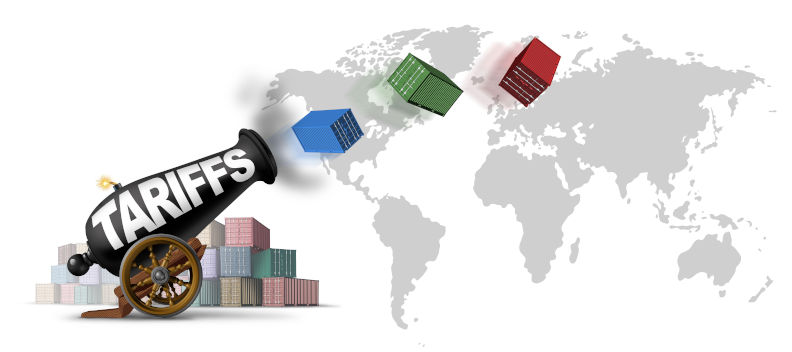US tariff policies strengthening China's position in Asia
April 10, 2025
In geopolitics, there are no permanent friends or enemies, but there are permanent interests. While many countries in Southeast Asia have tried to maintain their economic ties with the US and China, President Donald Trump’s economic and tariff plans are inadvertently helping China strengthen its position in Asia.
On 2 April, Trump announced a new round of tariffs, calling it “Liberation Day.” These tariffs include a 10% universal tariff on all imports and higher rates for several Asian countries such as China (34%), Vietnam (46%), Cambodia (49%), Laos (48%), Thailand (36%), Indonesia (32%), Malaysia (24%), and the Philippines (17%).
These reciprocal tariffs are the highest US taxes on trade since 1909. House Minority Leader Hakeem Jeffries called 2 April the “Recession Day”, highlighting the potential negative impact on the US economy. Many economists forecast that these wide-ranging tariffs will accelerate inflation and dampen US economic growth, resulting in stagflation as economic growth falters even as prices remain painfully high.
The stock market reacted sharply on 3 and 4 April, wiping out US$ 5 trillion in value.
Trump’s trade war with China
Trump’s view on China has been consistent since 2018 when he launched a trade war against China in his first term, including tariffs and export controls. He believes trade policy with China has been unfair.
Among all nations subject to the new reciprocal tariffs, Trump singled out China as a major target, imposing an additional 34% tariff on Chinese goods, bringing the total new levies this year to 54%. He also signed an executive order, eliminating the so-called de minimis provision for low-value parcels from China, effective from 2 May.
Companies like Shein and Temu have leveraged the $800 de minimis rule to ship low-value packages from China to the US duty-free. The elimination of this rule would significantly affect both companies, which ship more than a million packages daily to the US.
Higher reciprocal tariffs on countries such as Vietnam would close the backdoors that China has used for final assembly operations to change the country of origin to Vietnam and circumvent high tariffs on goods imported from China.
The combination of higher reciprocal tariffs on China and other countries in Asia and Southeast Asia and the elimination of the de minimis rule would affect China’s economy, which is experiencing slower growth. However, Trump’s reciprocal tariffs can help China strengthen its economic ties with other Asian countries.
Impact on Southeast Asian economies
The high reciprocal tariffs will reshape regional trade among Southeast Asian countries.
Geopolitically and economically, many Southeast Asian countries have tried to balance relations between the West and China. Vietnam, in particular, has a complex history with both sides. Despite past conflicts, Hanoi now fosters good relations with its communist neighbour while rapidly opening up to Western businesses and investments.
Vietnam and other Southeast Asian countries leverage their strategic location and significant economic potential to make them attractive partners for both China and the US. For example, countries such as Vietnam, Indonesia, and Malaysia use their burgeoning tech industries, growing consumer markets, and substantial manufacturing sectors to attract considerable interest.
Trump’s reciprocal tariffs could encourage Southeast Asian nations to solidify their alliances within ASEAN and leverage regional trade agreements such as the Regional Comprehensive Economic Partnership, a free-trade agreement involving 15 countries including the 10 ASEAN member states, Australia, Japan, New Zealand, and South Korea, to boost regional trade as intended.
Strengthening regional trade agreements
The high reciprocal tariffs imposed by the US can serve as a catalyst for China to strengthen its ties within Southeast Asia.
First, China can expand its influence through the RCEP and leverage its BRICS membership to enhance trade relations. Additionally, China is unlikely to lower its tariffs to appease Trump; instead, it has retaliated with 34% tariffs on US goods. Both countries’ increased tariffs will reduce bilateral trade.
While China can survive without importing most of the US$125 billion in American goods, the US and many other countries will continue to rely on China for various parts and components. Even if the US imports goods from other countries, those countries will still depend on China for parts.
Further, as China leads in electric vehicle battery production, Trump’s tariff policy could encourage Southeast Asian countries to deepen their economic ties with Beijing. BYD, for instance, has established new factories in Thailand and Indonesia, offering affordable EVs for regional markets.
Potential contradictions and economic consequences
Trump’s reciprocal tariffs are likely to cause a self-inflicted recession in the US. Also, it could create confusion and unintended consequences.
For example, Trump reported he had a call with Vietnam leader To Lam, who expressed a desire to cut Vietnam’s tariffs from 46% to zero. If this happens, it would contradict the “dubious” formula that Trump used to compute the reciprocal tariff, which is based on the country’s trade deficit divided by its exports to the US multiplied by 1/2. For example, America’s trade deficit with China in 2024 was US$295.4 billion, and the US imported US$439.9 billion worth of Chinese goods. That means China’s trade surplus with the United States was 67% of the value of its exports – a value the Trump administration labelled as “tariff charged to US.” And half of that is 34% as announced.
Even if the tariff on Vietnamese imports is reduced to zero, it is unlikely that the trade deficit between Vietnam and the US would disappear due to the reciprocal tariff formula. This is because Vietnam’s consumption capacity for US-made products is not comparable to the American consumer demand for electronic goods assembled in Vietnam.
Trump’s global tariff plan is putting the US at risk and nudging other Asian countries to strengthen their ties with China.

